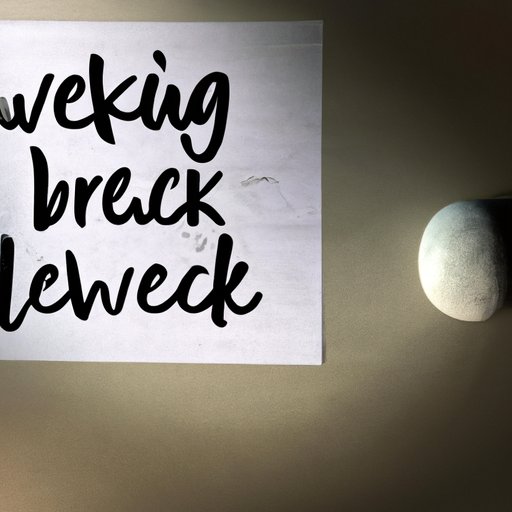Introduction
Anxiety is a common mental health condition that affects millions of people worldwide. It can manifest as intense worry or fear, difficulty concentrating, and physical symptoms such as chest tightness or sweating. Anxiety can significantly impact a person’s quality of life, making it difficult to function daily. This article aims to provide readers with practical strategies for managing their anxiety levels effectively.
Section 1: 7 Simple Hacks to Calm Your Mind When You’re Feeling Anxious
Having go-to strategies for dealing with anxiety is crucial for finding peace of mind. Here are seven practical tips to help calm your mind:
- Deep breathing: Take deep breaths in through your nose and out slowly through your mouth for a few minutes
- Mindfulness: Practice being in the present moment, focusing on what you see, hear, and feel.
- Exercise: Physical activity can help reduce anxiety symptoms by releasing endorphins and promoting better sleep.
- Calm music: Relax to soothing music, including nature sounds or classical music.
- Aromatherapy: Scents such as lavender, bergamot, and chamomile can help ease anxiety.
- Talking to a trusted friend: Vent to someone you trust and can confide in.
- Progressive muscle relaxation: Tense and relax your muscles from head to toe, focusing your attention on each body part.
Section 2: How to Cope When You’re Feeling Overwhelmed: A Step-by-Step Guide
Sometimes anxiety can be overwhelming, making it difficult to decide what to do next. Here are some steps to follow to help cope:
- Identify triggers: Determine what makes you anxious.
- Create a to-do list: Write out a list of tasks and prioritize them.
- Take a break from social media: Limit time spent on social media, which can exacerbate anxiety symptoms.
- Practice self-care: Take care of yourself by engaging in healthy activities like exercise, healthy eating, and sleeping well.
- Focus on reality: Focus on what is happening in the present moment and not let fears or worries come to the forefront.
Section 3: The Power of Self-Care: Tips to Help Ease Anxiety
Self-care is essential for everyone, but especially for those struggling with anxiety. Here are some self-care activities to try:
- Take a relaxing bath: Add Epsom salt or essential oils to a bubble bath for a soothing experience.
- Spending time outdoors: Being in nature can help reduce stress and anxiety levels in people.
- Read a good book: Reading can serve as an escape from stressors and promote better mental clarity.
- Pamper yourself: Indulge in activities like a massage, facial, or pedicure.
Section 4: From Yoga to Journaling: Ways to Manage Anxiety Naturally
Many natural remedies can be effective for managing anxiety. Here are some examples:
- Yoga or meditation: Both encourage relaxation, mindfulness, and deep breathing.
- Herbal supplements: herbal supplements like ashwagandha and passionflower can be used to reduce anxiety symptoms.
- Writing in a journal: Journaling allows people to document concerns and thoughts on paper while also releasing anxieties.
Section 5: Navigating Anxiety in the Workplace: Tips for Managing Stress on the Job
Anxiety can also manifest in the workplace, making it difficult to focus and be productive. Here are some tips to help manage anxiety while at work:
- Prioritize tasks: Create a to-do list, prioritize tasks, and schedule breaks for relaxation.
- Delegate responsibilities: If possible, delegate responsibilities and ask for help.
- Set boundaries: Try not to take on too much work or responsibilities that might trigger anxieties.
- Take breaks: Take breaks from work throughout the workday, such as going for a walk or meditating.
Section 6: A Therapist’s Guide to Navigating Anxiety: Tools for Taking Control
Getting professional help is crucial to help manage anxieties effectively. Here are some tools that a licensed therapist may suggest:
- Progressive muscle relaxation: Systematically contracting and relaxing different muscle groups in the body can be helpful in reducing anxiety levels.
- Mindfulness: It trains the mind to tune out negative thoughts and instead focus on the present.
- Positive self-talk: Changing the way we talk to ourselves, replacing negative self-talk with positive phrases, can make a huge difference in anxiety levels.
Section 7: Anxiety and Relationships: How to Communicate Your Needs and Manage Stress Together
Anxiety can impact relationships, so it is essential to communicate with loved ones about struggles. Here are some strategies for managing anxiety and stress together:
- Deep breathing exercises: Deep breathing together can calm the mind and foster healthy communication.
- Setting aside time for each other: Make time to connect with each other, and have open communication about anxieties.
- Engaging in self-care together: Encourage self-care activities like meditation or yoga together can be helpful in reducing anxiety symptoms.
Conclusion
Managing anxiety levels may seem like a difficult task, but it is possible with the right tools and mindset. Employ the range of hacks listed in this article that offer different ways of finding peace of mind. Seeking professional help can often be a critical component in managing anxiety while not letting the anxiety control you. Use some of the strategies offered in this article, and start living life anxiety-free.
(Note: Is this article not meeting your expectations? Do you have knowledge or insights to share? Unlock new opportunities and expand your reach by joining our authors team. Click Registration to join us and share your expertise with our readers.)
